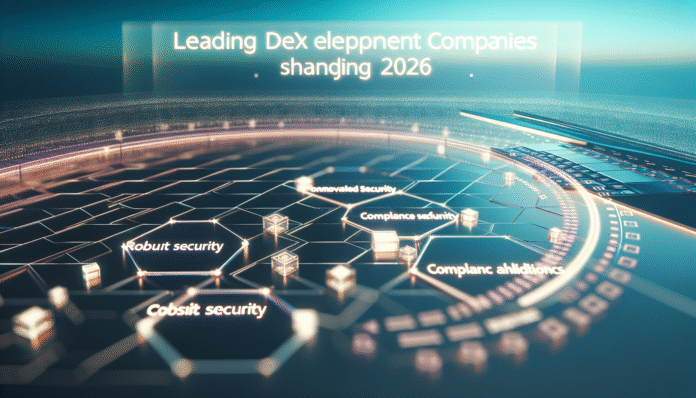The decentralized finance landscape has undergone a seismic shift. What once thrived on speculation and experimental tokenomics has matured into a sophisticated ecosystem where institutional capital flows seamlessly, compliance frameworks operate in tandem with decentralized protocols, and user experience rivals centralized counterparts. As we head into 2026, the demand for professional-grade DEX development has never been higher. Institutions, retail traders, and enterprises alike are seeking platforms built on robust infrastructure, cross-chain interoperability, and institutional-grade security. The DEX development companies leading this charge aren’t just building exchanges—they’re architecting the financial rails of Web3’s future.
The Evolution of DEX Development: Why 2026 Matters
The early days of decentralized exchanges were characterized by experimentation and risk. Liquidity was fragmented, slippage was brutal, and security audits were afterthoughts. Today’s DEX landscape demands something entirely different. The platforms capturing market share in 2026 are those addressing the trifecta of modern DeFi: deep, aggregated liquidity, transparent, institutional-grade pricing, and built-in risk management.
What distinguishes leading DEX development companies from the rest is their ability to thread the needle between decentralization and practicality. They understand that compliance isn’t the enemy of innovation—it’s the gateway to mainstream adoption. Real-time monitoring systems, automated safeguards, and custodial integrations now sit comfortably alongside decentralized primitives. Yield generation has evolved from token-flip schemes to algorithmic strategies offering sustainable returns. Security, interoperability, and seamless user experience are no longer nice-to-haves; they’re table stakes.
The Top DEX Development Companies Shaping 2026
Ideasoft: Comprehensive Blockchain Solutions with Global Reach
Founded in 2016, Ideasoft has positioned itself as a cornerstone of Web3 and blockchain development. With development centers spanning Ukraine, the EU, and the UAE, the company brings a truly global perspective to DEX architecture. Ideasoft specializes in creating complete decentralized exchange solutions, combining technical depth with an understanding of regulatory landscapes across multiple jurisdictions. Their experience building full-stack DEX platforms makes them particularly valuable for enterprises looking to launch compliant, scalable exchanges.
Technorely Inc.: Fintech Expertise Meets Crypto Innovation
Based in Vancouver with operations in Washington, DC, Technorely Inc. has carved out a niche at the intersection of traditional fintech and blockchain development. Since 2018, they’ve built automated trading systems, digital wallets, and cryptocurrency exchange platforms that appeal to institutions seeking familiar operational patterns with decentralized architecture. Their multi-currency wallet supporting local payments across 200+ countries demonstrates a commitment to accessibility without sacrificing sophistication.
OmiSoft: DeFi-First Platform Development
OmiSoft, headquartered in Kyiv with an Estonian office, brings specialized expertise in DeFi and DEX platforms. Their development approach encompasses decentralized token exchanges, liquidity pool management, staking systems, and customized fee handling. What sets OmiSoft apart is their focus on creating safe, independent DEX platforms where every component—from token exchange mechanics to fee structures—is tailored to client specifications. For projects requiring white-label solutions with deep customization, OmiSoft delivers.
Aegas Inc.: Web3 Specialization with Enterprise Reach
Aegas Inc. focuses squarely on the Web3 and crypto sectors, offering a comprehensive suite of DeFi exchange development services, staking platforms, liquidity solutions, and smart contract architecture. Their portfolio spans NFT projects, DAOs, and IDOs, giving them exposure to the full breadth of decentralized finance. This breadth of experience translates into platform development that accounts for the interconnected nature of modern DeFi ecosystems.
QIT Software: Boutique Expertise with Institutional Quality
QIT Software, founded in 2020 and based in Tallinn, Estonia, operates as a Europe-US outsourcing specialist with a lean, focused team. Despite their smaller size, they’ve developed impressive blockchain and smart contract capabilities, including user-friendly cryptocurrency exchanges featuring mobile apps and cross-chain NFT marketplaces. Their integration of yield-generation tools—such as liquidity pools via Beefy.finance on Avalanche and Polygon networks—demonstrates understanding of how modern DEX platforms create sustainable value for users.
ConsenSys: Enterprise-Grade Infrastructure and Governance
With offices across New York, the USA, UAE, Europe, and Asia, ConsenSys operates at the intersection of foundational blockchain infrastructure and enterprise adoption. Their work collaborating with the European Central Bank on CBDC prototyping and developing Codefi—a suite for decentralized finance and asset tokenization—positions them as architects of compliant, institutional-facing DEX infrastructure. ConsenSys brings the governance frameworks and regulatory expertise that enterprises demand.
Antier Solutions: Security-First DEX Architecture
Antier Solutions combines deep blockchain expertise with an unwavering focus on security and scalability. Their DEX development services encompass the full spectrum: from smart contract creation to complete dApp solutions. What differentiates Antier is their emphasis on risk management frameworks built into protocol design, rather than bolted on afterward. For projects where security incidents carry existential risk, Antier’s approach proves invaluable.
Markovate: Proven Track Record at Scale
With 300+ projects delivered and over a decade in business, Markovate brings battle-tested expertise to DEX development. Their service portfolio includes wallet development, NFT marketplaces, decentralized exchanges, smart-contract creation, and full dApp solutions. Their offer of Blockchain-as-a-Service appeals to enterprises that want to leverage distributed ledger technology without building infrastructure from scratch. Markovate’s institutional-grade delivery model appeals to companies seeking predictable project outcomes.
Alchemy: Infrastructure Powering the DEX Ecosystem
Headquartered in San Francisco, Alchemy powers over $100 billion in on-chain transactions annually through its API suite and serves as backbone infrastructure for OpenSea, the world’s largest NFT marketplace. Their rapid developer onboarding and performance-driven tools make them essential for DEX projects requiring bulletproof infrastructure. Alchemy’s role in supporting Adobe’s digital creator tools demonstrates their ability to bridge traditional enterprises with blockchain ecosystems.
What to Look for in a DEX Development Partner
Selecting the right development partner transcends resume review. Leading DEX development companies in 2026 demonstrate several critical capabilities: cross-chain interoperability ensuring liquidity flows seamlessly across networks; institutional compliance integration addressing regulatory requirements without compromising decentralization; real-time risk monitoring systems that prevent cascading failures; and sustainable yield architecture built on algorithmic strategies rather than unsustainable token incentives.
Security audits, while important, serve as baseline requirements rather than differentiators. The real differentiation emerges in how companies architect transparency into pricing mechanisms, how they design fee structures that incentivize ecosystem participation, and how they create user experiences that make institutional traders feel at home in decentralized environments.
The Future of DEX Development: What’s Next
Looking ahead, the DEX development companies capturing the largest share of institutional capital will be those solving the interoperability trilemma: maintaining security while enabling seamless cross-chain liquidity aggregation and delivering institutional-grade user experience. The platforms that mature beyond single-chain deployments into truly multi-chain architectures will unlock unprecedented liquidity efficiency.
Furthermore, the integration of real-world asset tokenization into DEX infrastructure represents the next frontier. Companies already positioning themselves to bridge traditional finance with decentralized protocols will lead the charge into this expansion.
Conclusion: Building the DEX Infrastructure of Tomorrow
The DEX development companies outlined above represent the vanguard of a maturing DeFi ecosystem. They’ve moved beyond simply translating centralized exchange logic into smart contracts. Instead, they’re architecting fundamentally new models for value discovery, liquidity provision, and risk management. As 2026 unfolds, the projects that succeed will be those built by partners who understand that institutional adoption requires more than decentralization—it demands security, compliance, interoperability, and exceptional user experience working in concert. The companies listed here have demonstrated this understanding, making them the unmissable picks for anyone serious about launching the next generation of decentralized financial infrastructure.















